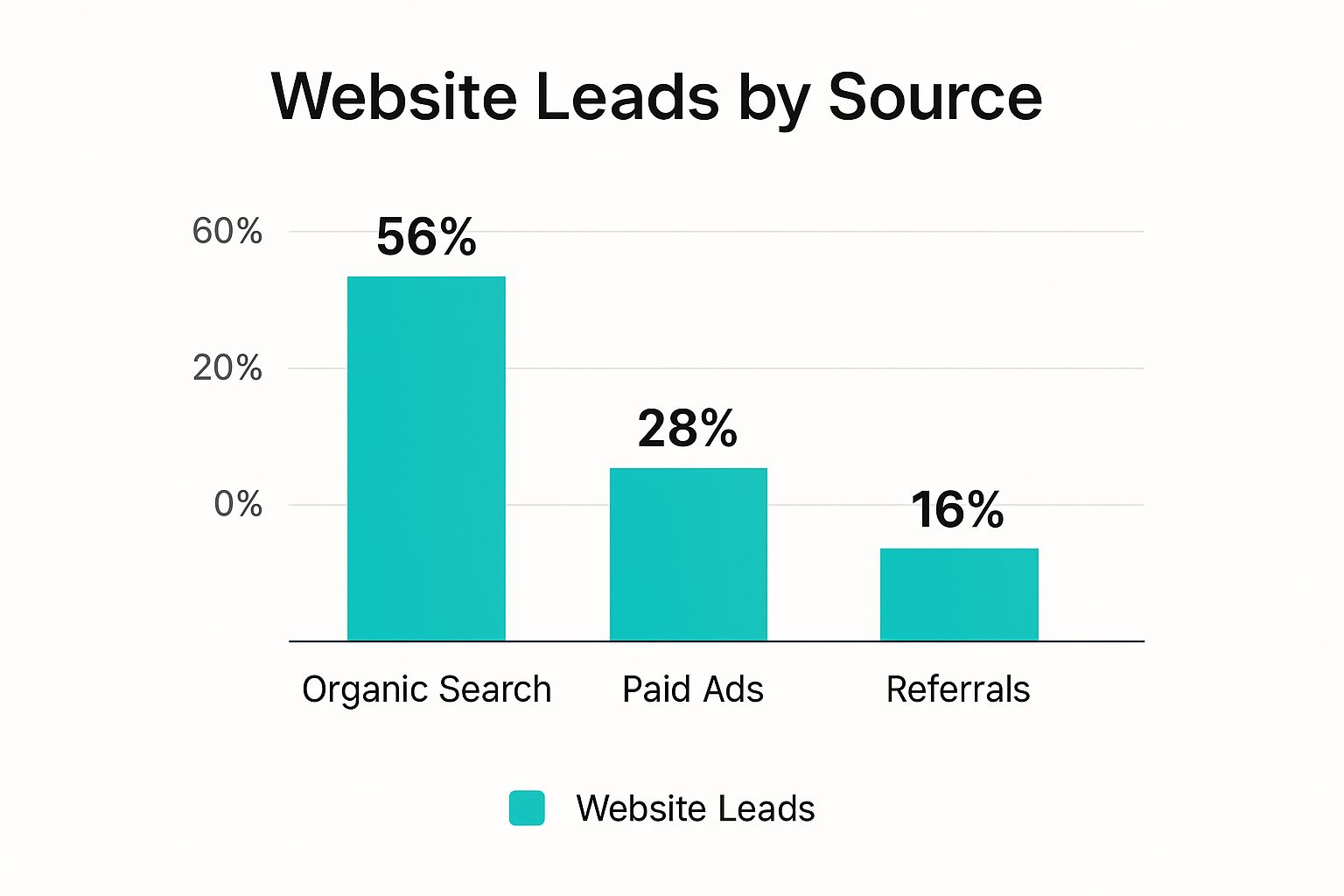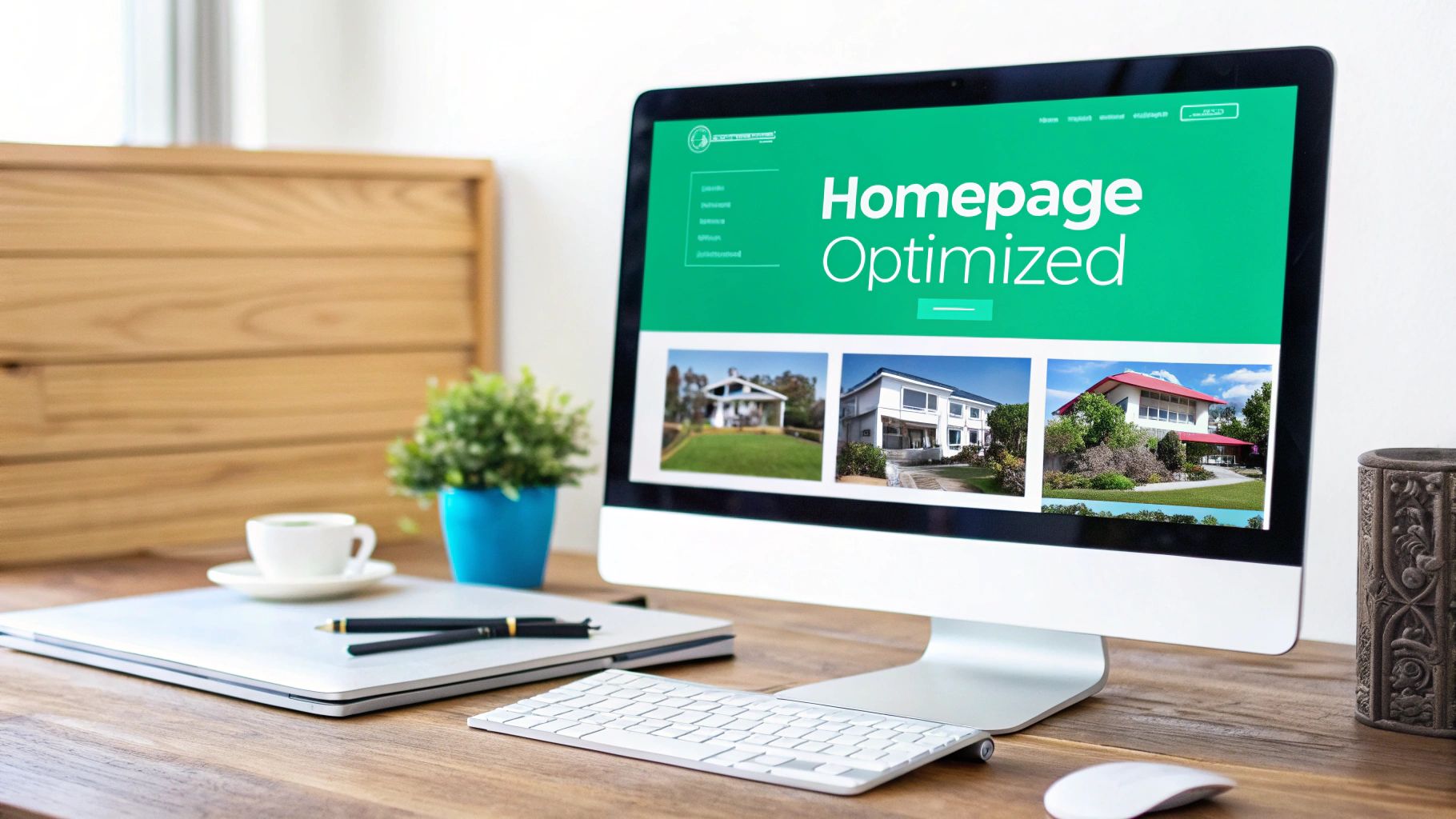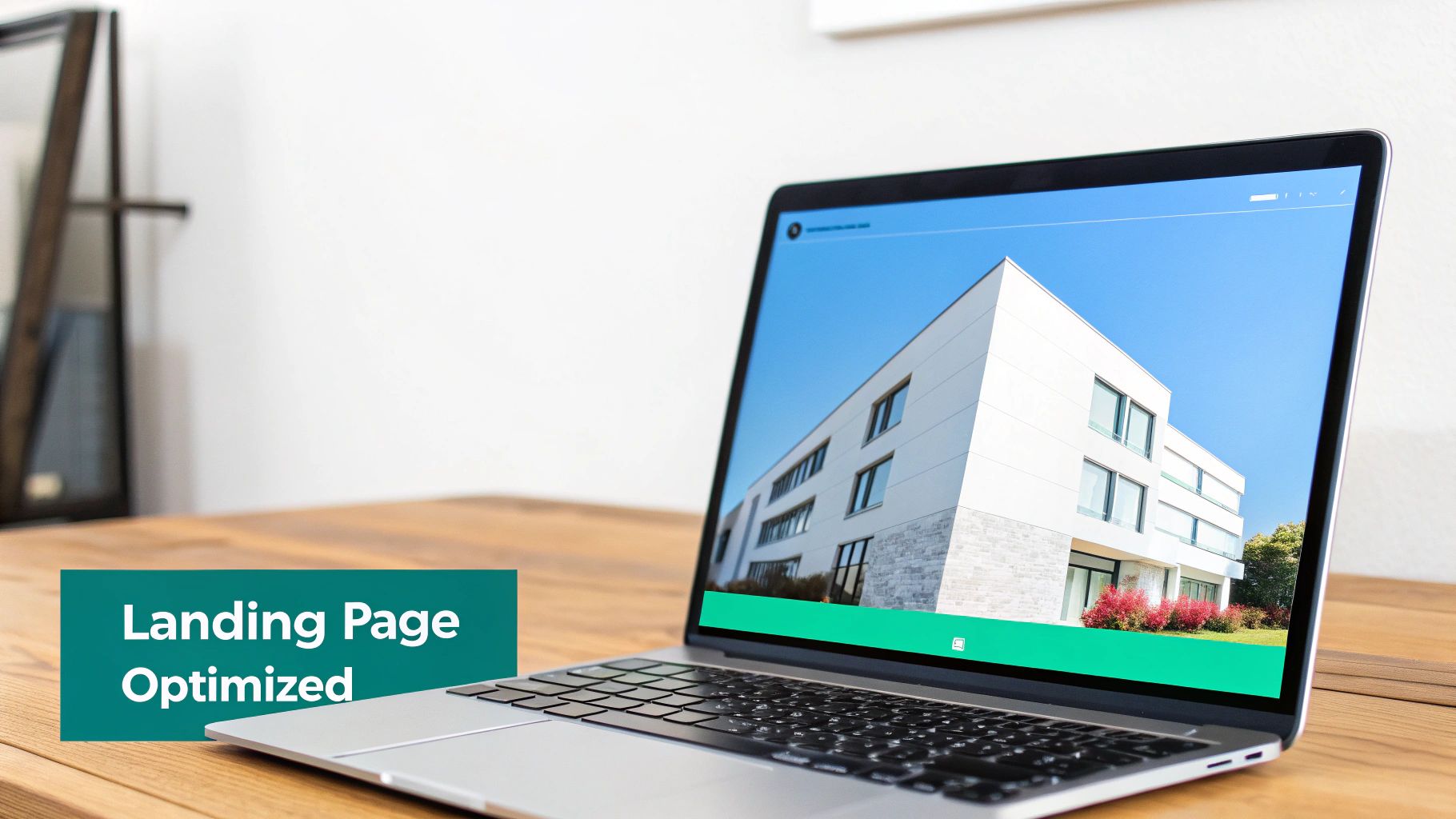Why Most Real Estate Websites Fail At Lead Generation
Let's be honest, a lot of real estate websites are like ghost towns. I've worked with so many agents who have these gorgeous sites that just don't bring in any leads. They look great, but they're built like online brochures instead of lead-generating powerhouses. The game has changed. Successful agents get that their website isn't just a digital business card; it's their main tool for growing their business.
The Conversion Reality Check
Let's talk numbers. Many agents think that just having a website means leads will magically appear. Not true! You need a real strategy for real estate website lead generation. This infographic shows the typical breakdown of lead sources:

Organic search usually brings in the most leads, followed by paid ads and then referrals. This shows how important SEO and smart ad campaigns are. Knowing these benchmarks helps you set realistic goals and use your marketing budget wisely.
The Shift To Digital Dominance
Digital marketing has become the biggest source of real estate website leads worldwide, especially in places like the U.S. In 2023, digital marketing made up 54.2% of an agent's marketing budget in the U.S., and it was projected to hit 58.6% by the end of the year. This shows how effective online channels are. Top real estate websites like Zillow and Realtor.com get conversion rates over 5%, while the average is only 2%. Learn more about this trend here. A strong online presence is key.
To understand how your website stacks up against industry standards, let’s look at some typical conversion metrics. The following table, “Real Estate Website Performance Benchmarks,” compares conversion rates and click-through rates (CTR) for various digital marketing channels:
| Channel | Average CTR | Conversion Rate | Lead Quality Score |
|---|---|---|---|
| Organic Search | 2.5% | 3% | High |
| Paid Ads (Google Ads) | 4% | 2% | Medium |
| Social Media (Facebook, Instagram) | 1% | 0.5% | Low |
| Email Marketing | 5% | 4% | High |
| Referrals | N/A | 10% | Very High |
As you can see, while referrals tend to have the highest conversion rates, they are less predictable than other channels. Organic search, with a good conversion rate and high lead quality, is a crucial area to focus on. Paid ads, though having a higher CTR, often yield lower quality leads. Knowing these differences can help you prioritize your efforts.
Common Website Mistakes That Kill Conversions
Lots of agents invest in beautiful websites that don't generate leads. Here's why:
-
Lack of Clear Calls to Action: Tell visitors exactly what to do. Use clear calls to action like "Schedule a Consultation," "Download Our Market Report," or "Get a Free Home Valuation.”
-
Poor Mobile Optimization: Most real estate searches happen on phones. A site that isn't mobile-friendly loses potential leads.
-
Slow Loading Speeds: A slow site frustrates visitors and sends them to your competitors.
-
Ignoring SEO: If your site doesn't show up in search results, clients won't find you. SEO is essential for driving organic traffic.
-
Generic Content: Content that doesn't offer real value won't keep visitors engaged. Focus on informative, local content that meets their needs.
By fixing these common problems, you can turn your website into a lead-generating machine. Your website is your most important tool in today's real estate market. Make it work for you.
Building A Website That Captures Leads While You Sleep
Your real estate website needs to be more than just pretty; it needs to be a lead-generating powerhouse. Too many agents get caught up in aesthetics, but the real magic lies in designing every element to capture visitor information. Think of it like this: you want a website that works as hard as you do, bringing in leads even while you’re busy showing properties or enjoying some downtime.
Psychology of Lead Capture
The most successful real estate websites understand the psychology of persuasion. It’s not about being aggressive; it’s about providing real value and making the process of sharing contact info as smooth as possible. And placement is key. Don't bury your lead capture forms. Feature them prominently on high-traffic pages, like your homepage and, crucially, your property listings.
For example, Zillow does a fantastic job of capturing leads right on their property search pages. Check out this screenshot:

See how Zillow puts the agent’s contact info front and center, offering multiple ways for users to connect? It makes it super easy for interested buyers to reach out.
The Language of Conversion
The words you use on your lead capture forms have a surprising impact. Ditch generic phrases like "Submit" or "Contact Us." Instead, try action-oriented language that speaks directly to what the visitor wants. Think "Get a Free Home Valuation," "Request a Showing," or "Download Our First-Time Homebuyer's Guide." These options create a sense of immediate value and encourage engagement.
Irresistible Lead Magnets
Lead magnets are your secret weapon for real estate website lead generation. These are valuable resources that visitors are happy to exchange their contact information for. Neighborhood guides, market reports, home staging checklists, even a free consultation – they can all work wonders. The trick is to offer something genuinely useful to your target audience. In my experience, hyperlocal guides tailored to specific neighborhoods perform exceptionally well. People searching online often crave detailed local insights.
Mobile Optimization is Non-Negotiable
Let's face it, most of your website traffic comes from mobile devices. Your site absolutely must be responsive, adapting seamlessly to different screen sizes. A clunky mobile experience will send potential leads running straight to your competitors. Test your website on a variety of phones and tablets to make sure it loads quickly and is easy to navigate.
Building Trust Through Design
Subtle design choices can significantly influence how trustworthy visitors find your website. High-quality images, professional branding, testimonials, and clear contact information all contribute to that sense of trust. Avoid cluttered layouts, distracting animations, and anything that feels unprofessional. You might be interested in: Swish Web Designs website services. Remember, your website is often the first impression a potential client has of you. Make it a good one. Focusing on these details can transform casual browsers into qualified leads, nurturing them on their journey to becoming your next clients.
Content That Turns Strangers Into Qualified Prospects
Content marketing for real estate isn't about throwing random blog posts online and hoping for the best. It's about creating truly helpful resources that solve real problems for potential clients, ultimately positioning you as the local expert they need. The best agents understand that their content needs to speak to every stage of the client journey, from the initial "just browsing" phase all the way to the "I'm ready to make a move right now" moment.
Content Formats That Convert
I've seen some content formats absolutely crush it when it comes to generating leads for real estate websites. Market reports, for instance, are fantastic for establishing your expertise, while neighborhood guides are pure gold for capturing those hyperlocal searches. And let's not forget about property valuation tools – those are a lead-generating powerhouse, collecting contact info in a natural, non-pushy way. I mean, who doesn't want a free estimate of what their home is worth?
-
Market Reports: These showcase your in-depth understanding of what's happening in the local market. We're not talking generic stats here; these are insightful analyses that provide real value to potential clients.
-
Neighborhood Guides: Go deep on the local level. These guides are packed with details about schools, parks, restaurants, that cool new coffee shop – everything that makes a neighborhood special.
-
Property Valuation Tools: This is an easy win for capturing leads. Offer a free, automated valuation in exchange for contact information.
Content Frameworks for Success
Successful agents use specific frameworks to structure their blog posts, landing pages, and downloadable resources. Think of these not as rigid templates, but more like proven blueprints to guide the content creation process. These frameworks are designed to maximize conversion rates, often significantly exceeding industry averages. Consider creating content pillars around key topics like "First-Time Homebuyer's Guide," "Selling Your Home for Top Dollar," or "Investing in Real Estate." Then, create supporting content – think blog posts, downloadable checklists, short videos – around these core pillars. This builds your authority and gives potential clients valuable information they can actually use.
Content Repurposing and Distribution
Think of your content as having multiple lives. One blog post can be repurposed into several social media updates, an email newsletter, or even a series of short videos. This expands your reach without requiring you to create new content from scratch. It’s like getting the most bang for your buck with every piece of content. You're essentially maximizing your investment. You might even consider exploring Swish Web Designs SEO services. Plus, sharing across platforms means you're connecting with potential clients where they’re already spending their time.
Measuring Content Performance
Forget about vanity metrics like page views. Focus on what actually moves the needle: leads, conversions, and ultimately, closed deals. Track how your content contributes to your bottom line. This allows you to fine-tune your content strategy and double down on what's working. It's about quality over quantity, every single time. By analyzing how your content impacts your business goals, you can create a real estate website lead generation machine that consistently delivers.
Focusing On Lead Quality Over Lead Quantity
When it comes to generating leads for your real estate website, remember this: it's not a numbers game. I've chatted with countless successful agents, and the real winners are the ones who prioritize quality leads over sheer quantity. They know that chasing every single lead is a one-way ticket to burnout town. It’s all about working smarter, not harder.
Qualifying Leads: Separating the Wheat From the Chaff
So, how do you distinguish between a lead that's likely to turn into a commission check and one that’s just going to drain your time and energy? You need a system. Think of it like this: you're panning for gold. You'll sift through a lot of dirt before you find those precious nuggets. The key is to qualify your leads quickly and efficiently.
-
Ask the Right Questions: When you connect with a potential client, ask targeted questions to gauge how serious they are. Are they looking to buy or sell in the next few months? What’s their budget? What are their must-haves in a property? A simple phone script can work wonders in separating serious buyers and sellers from casual window shoppers.
-
Look for Red Flags: Be on the lookout for warning signs. Leads who are vague about their needs, constantly changing their minds, or reluctant to share basic information might not be worth your time. Trust your instincts – you've probably developed a pretty good radar for these things by now!
Follow-Up Systems That Nurture and Convert
Once you've identified your high-quality leads, the real work begins: nurturing those relationships. This is where a systematic follow-up process becomes essential. It's about building connections, not just closing deals. Buying or selling a home is a huge decision, and people need time to process.
-
Automated Email Sequences: Mailchimp (or similar email marketing platforms) can help automate email sequences that provide value and keep you top-of-mind without requiring constant manual emails. Share market updates, interesting neighborhood insights, or helpful home maintenance tips.
-
Personal Touches: While automation is your friend, don’t underestimate the power of personal connection. A handwritten note, a quick phone call, or a personalized email can make all the difference. These small gestures show you genuinely care and set you apart from agents who rely on generic, impersonal approaches. It’s about building trust, and that’s what truly converts leads into clients.
Lots of agents get so caught up in generating more leads that they forget to nurture the ones they already have. While real estate agents receive a ton of leads, many aren’t high-quality or ready to convert. On average, an organization generates around 1,877 leads monthly, with about 1,523 (81%) being 'marketing qualified leads' (MQLs). But real estate is a different beast. The average agent gets about 100 leads a month, with top performers often exceeding 200. The challenge isn't getting leads; it’s converting them. Real estate internet lead conversion rates typically hover between 1% and 3.5%, depending on the source. Referrals convert at about 2.7%, while organic search and paid search convert at 2.2% and roughly 2% to 2.88% respectively. Email marketing boasts a higher conversion rate at 3.5%, highlighting its effectiveness in nurturing potential clients. For more fascinating stats, check this out: Lead Generation Statistics.
Let’s take a closer look at conversion rates from various lead sources:
Lead Source Conversion Rate Analysis
Comparison of conversion rates and lead quality across different real estate lead sources
| Lead Source | Conversion Rate | Average Time to Close | Cost Per Lead |
|---|---|---|---|
| Referrals | 2.7% | Typically Faster | Low |
| Organic Search | 2.2% | Varies | Moderate |
| Paid Search | 2% – 2.88% | Varies | High |
| Email Marketing | 3.5% | Can be longer | Low to Moderate |
As you can see, referrals often offer the quickest closing times and the lowest cost per lead. While email marketing might have a longer sales cycle, its higher conversion rate makes it a valuable tool. Paid search, although potentially generating a higher volume of leads, comes with a higher cost and a lower conversion rate compared to other sources. This underscores the importance of focusing your efforts on strategies that generate high-quality leads rather than simply chasing large numbers.
Tracking and Optimizing Your Sales Funnel

Visualize your lead generation process as a funnel. At the top, you have a wide pool of potential leads. As you move down the funnel, you qualify and nurture these leads, gradually narrowing them down to the most promising prospects.
-
Measure Conversion Rates: Keep a close eye on your conversion rates at each stage of your sales funnel. This will help you pinpoint any bottlenecks or areas that need tweaking. Are leads dropping off after the initial contact? Are they not engaging with your emails? Identifying these weak points allows you to make data-driven improvements.
-
Prioritize High-Probability Prospects: Devote your time and energy to the leads that are most likely to convert. Don’t get bogged down by low-quality leads that distract you from your high-value prospects. Learn to recognize the signs of a truly qualified lead, and focus your efforts there.
By concentrating on lead quality, implementing effective follow-up systems, and consistently tracking your progress, you can supercharge your real estate website lead generation and build a thriving, sustainable business. It’s about creating a system that works for you, allowing you to connect with the right clients and cultivate those all-important long-term relationships.
Automation Tools That Scale Your Real Estate Website Lead Generation
The best real estate agents aren't working harder, they're working smarter. They're using tech to automate their lead generation, freeing up their time for those all-important personal connections. Think of it like having a super-efficient assistant working around the clock to bring in potential clients. Let's dive into some powerful tools that can transform your website from a static online brochure into a dynamic lead-generating machine.
CRM Integration: Your Central Command Center
A solid Customer Relationship Management (CRM) system, like HubSpot or Salesforce, is absolutely crucial for real estate website lead generation. When your website and CRM are integrated, it automatically segments prospects based on their activity. Someone downloading a first-time homebuyer's guide gets tagged differently from someone browsing luxury listings. This automation lets you tailor your follow-up with relevant info, nurturing those leads effectively. It's all about personalized experiences at scale.
Email Automation: Nurturing Leads on Autopilot
Think of automated email sequences as your personal follow-up system working tirelessly in the background. They deliver valuable content to leads over time, keeping you top-of-mind without you lifting a finger. Imagine a series of emails educating prospects about the local market, offering helpful home-buying/selling tips, and gently guiding them toward a consultation. All this happens automatically, nurturing leads while you focus on other tasks.
Chatbots: Capturing Leads After Hours
Chatbots are like having virtual receptionists, available 24/7. They answer FAQs and capture lead info, even when you're off duty. I've seen chatbots successfully qualify leads after hours by gathering basic info like budget, desired location, and timeframe. This frees you up to focus on converting those warm leads into clients. That immediate response can be the difference between winning a client and losing them to a competitor.
AI-Powered Lead Scoring: Prioritizing Your Time
AI-powered lead scoring tools, like those offered by LeadSquared, analyze data to rank leads based on their likelihood of converting. It's like having a virtual assistant pre-qualify leads for you. This helps you prioritize your efforts, focusing on the most promising prospects first. This smarter approach boosts efficiency and maximizes your time. Speaking of improving your online presence, you might also find our guide on Swish Web Designs SEO services helpful.
Automated Follow-Up: Ensuring No Prospect Gets Lost
Automated follow-up systems ensure every lead gets the attention they deserve. From personalized email sequences to automated text reminders, these systems keep you organized and nurture leads through every stage of the sales process. No more scrambling through spreadsheets or forgetting to follow up – the system handles it all. The impact of this tech is huge. Top-performing real estate companies use tools like AI and predictive analytics to deliver high-quality leads. Investment in these services is on the rise, even though 25% of Realtors spent less than $50 per month on lead generation last year. The best services provide exclusive leads and integrate smoothly with agents' current workflows. For deeper insights, check out this article on top real estate lead generation companies. These tools aren't just about automating tasks; they're about enhancing the client experience and effectively scaling your business.
Driving The Right Traffic To Your Lead Generation Machine
Building a fantastic real estate website is a great start, but it's only half the battle. It’s like having a shiny new sports car parked in the garage — it won't get you anywhere unless people actually see it. Successful real estate agents know this: they're pros at attracting their ideal clients through a smart mix of SEO, targeted advertising, social media, and local networking.
Dominating Search Results With SEO
Think of SEO as the engine driving organic traffic to your website. It's all about optimizing your site to rank high in search results for the keywords your ideal clients are using. When someone Googles "homes for sale in [your city]" or "real estate agent in [your neighborhood]", you want your website to be one of the first they see. This isn’t about stuffing your website with keywords; it’s about creating valuable content that answers people's questions.
To streamline your real estate lead generation, consider adding automation to your workflow. Check out these content creation automation strategies.
-
Target Buyer and Seller Keywords: Zero in on keywords directly related to buying and selling real estate in your area. Think "condos for sale downtown [city name]" or "best real estate agent for first-time home buyers in [neighborhood name]".
-
Local SEO is Key: Claim and optimize your Google Business Profile. Make sure your NAP (Name, Address, Phone Number) is consistent across all online platforms. This helps Google understand your business location and show your website to local searchers.
-
Content Marketing That Converts: Create blog posts, neighborhood guides, market reports, and other resources that provide genuine value. I’ve seen firsthand how this not only attracts organic traffic but also establishes you as a local expert.
Paid Advertising: Reaching the Right People
While SEO builds long-term organic traffic, paid advertising gives you an immediate boost. Platforms like Google Ads and Facebook Ads let you target specific demographics and interests, ensuring your message reaches the right people. Tracking your ROI is essential to ensure your ad spend generates leads that convert.
-
Facebook and Google Ads: Run targeted campaigns focusing on demographics that align with your ideal clients. Test different ad creatives and messaging to see what performs best. Sometimes a slight tweak in wording can make all the difference.
-
Retargeting Campaigns: Don't lose those website visitors who didn't convert right away. Retargeting campaigns allow you to re-engage these prospects with tailored ads, reminding them of your services.
Social Media: Building Relationships and Generating Leads
Social media is a powerful tool, but it's more than just pretty pictures. You need a strategy that attracts serious prospects.
-
Engaging Content: Share market updates, home staging tips, and behind-the-scenes glimpses into your work. This builds trust and shows your expertise. People love seeing the human side of real estate.
-
Targeted Ads: Use social media advertising to reach potential clients based on their interests and online behavior.
-
Community Engagement: Join local Facebook groups and online conversations. Answer questions and build relationships within your community. This is where you can really shine as a local expert.
Referrals and Local Networking: The Power of Connection
Never underestimate the power of your network. Referrals are often high-quality leads because they come with built-in trust. Local networking can open doors to new clients and partners.
-
Leverage Existing Contacts: Reach out to past clients, friends, and colleagues. Let them know you're looking for new clients and encourage referrals.
-
Local Marketing Initiatives: Sponsor local events, partner with community organizations, and attend neighborhood gatherings. This increases your brand visibility and establishes you as a trusted community member.
By using these targeted traffic generation strategies, you can transform your real estate website from a static online brochure into a dynamic lead-generating machine. It’s not just about getting traffic; it’s about getting the right traffic – the kind that turns into clients and grows your business.
Your Real Estate Website Lead Generation Action Plan
Now that we've got the core strategies down, let's map out your personalized plan for generating leads through your real estate website. Forget about trying every single tactic out there. We're going to zero in on the ones that will truly move the needle for your specific business and your local market.
Auditing Your Current Website Performance
Before we change anything, we need a good understanding of what's already working (and what isn't). Think of it as a check-up for your website. Here’s how we’ll approach it:
-
Analyze Your Traffic Sources: First, where are your visitors coming from? Google Analytics is your go-to for this data. Knowing which channels are sending you the most traffic helps you double down on what's effective.
-
Identify Conversion Bottlenecks: Next, are people leaving your site at certain points? Look for pages with high bounce rates or low conversion rates. These are the leaks in your lead pipeline.
-
Review Your Existing Lead Capture Forms: Finally, are your forms easy to find and complete? Does the wording entice visitors? Are you offering valuable lead magnets? Small tweaks can make a surprising difference.
Prioritizing Improvements for Fast Results
Once you’ve found your website's weak spots, let’s prioritize. We’ll go for the quick wins first.
-
Low-Hanging Fruit: Start with the easy fixes. Think optimizing page load speed, making your website mobile-friendly, and adding crystal-clear calls to action. These can have a big impact without a huge time investment.
-
High-Impact Changes: After that, we'll tackle the larger projects. Things like creating compelling lead magnets, optimizing your website for local SEO, and setting up targeted ad campaigns. These require more effort, but they deliver long-term results. Driving the right traffic is key for lead generation. For some inspiration, check out these lead generation campaign examples.
Realistic Timelines and Budget Considerations
It's crucial to be realistic. Don't try to do it all at once. Instead, break your plan down into phases:
- Phase 1: Quick Wins (1-2 weeks): We'll focus on that low-hanging fruit.
- Phase 2: High-Impact Changes (1-2 months): Then, we’ll implement the more complex improvements.
- Phase 3: Ongoing Optimization (ongoing): Finally, we'll continuously test and refine your strategy.
Set a budget that aligns with your goals and resources. You don't have to break the bank, but be ready to invest in tools and services that will bring in a return.
Tracking Your Progress With the Right Metrics
Focus on metrics that actually matter: leads, conversions, and closed deals. Don’t get sidetracked by vanity metrics like page views. Here’s what we’ll track:
- Lead Capture Rate: How many visitors are completing your lead capture forms?
- Conversion Rate: How many leads are becoming clients?
- Cost Per Lead: How much does it cost you to acquire each lead?
Overcoming Implementation Challenges
Here are a few common roadblocks and how to navigate them:
- Overwhelm: Break your plan into smaller, manageable steps. One step at a time.
- Lack of Time: Block off specific time for implementation, even if it’s just an hour each day.
- Technical Challenges: Don't be afraid to get help. Hire a web developer or SEO expert if you need to.
By following this action plan, you can turn your real estate website into a reliable lead-generating machine. Remember, it’s a marathon, not a sprint. Stay focused, track your progress, and celebrate your wins along the way. Ready to elevate your online presence? Check out Swish Web Designs for website services designed specifically for real estate professionals.


